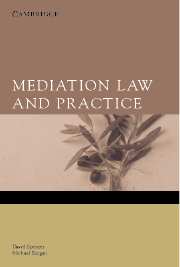Book contents
- Frontmatter
- Contents
- Acknowledgements
- Preface
- List of tables and figures
- Table of statutes
- Table of cases
- PART I THE PRACTICE OF MEDIATION
- PART II THE LAW OF MEDIATION
- 8 Mandatory Mediation
- 9 Confidentiality
- 10 Settlement Agreements
- 11 State Sponsored Mediation
- 12 Mediation Clauses in Contracts
- 13 Liability in Mediation
- 14 The Future of Mediation
- Bibliography
- Index
14 - The Future of Mediation
Published online by Cambridge University Press: 05 June 2012
- Frontmatter
- Contents
- Acknowledgements
- Preface
- List of tables and figures
- Table of statutes
- Table of cases
- PART I THE PRACTICE OF MEDIATION
- PART II THE LAW OF MEDIATION
- 8 Mandatory Mediation
- 9 Confidentiality
- 10 Settlement Agreements
- 11 State Sponsored Mediation
- 12 Mediation Clauses in Contracts
- 13 Liability in Mediation
- 14 The Future of Mediation
- Bibliography
- Index
Summary
Introduction
If there has been a paradigm shift in the theory and practice of the classical model of mediation (i.e. the model discussed in Chapter 2 of this book that consists of the basic steps attributable to the mediation process) since its formalisation – arguably thirty years ago – then it is probably evidenced by three distinct changes. First, mediation is now employed successfully as a conflict management tool: that is, mediation is no longer reserved for the resolution of disputes; rather, it is used to deal with conflict before such conflicts escalate into full-blown adversarial disputes. In this sense conflict is now being managed or prevented rather than needing to be resolved. This shift is most noticeable in the organisational landscape of Australian government, business and communities.
While mediation purists, schooled in classical mediation processes, decry any move away from the effective but restrictive classical model of mediation – where opening statements are delivered like an over-rehearsed Shakespearean soliliquy and separate sessions are conducted in as ritualistic a manner as a Catholic Mass – the mediation realists mourn the opportunities lost through a rigid adherence to a process valued for its flexibility. The hybrid forms of mediation are as many and varied as the individuals and organisations that have benefited from them, yet there is scant acknowledgment of mediation's ability to assist in the management and prevention of conflict and hence the avoidance of disputation requiring resolution.
- Type
- Chapter
- Information
- Mediation Law and Practice , pp. 459 - 493Publisher: Cambridge University PressPrint publication year: 2007



